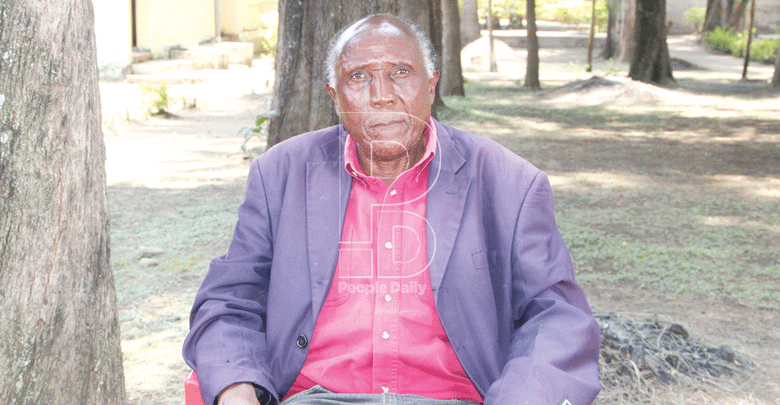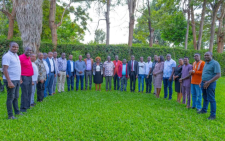Our daughters will inherit my land

In a typical African society, land rights were only inherited by sons. Women rarely had full rights to land.
They were seen as secondary claimants, through male relatives. Before getting married, a woman might have access to her father’s land.
But in many communities, she lost that right with marriage, on the assumption that she would then gain access to the land of her husband or of his family.
When a husband died, his land passed on to any sons they might have had or to male relatives if there were none.
The situation is much worse for widows as they are dispossessed of their husband’s property and also denied land and a place to be buried in their father’s land.
Disinheritance is a serious issue that undermines the economic security of women and orphans who are left destitute and homeless.
Having seen this happen in her family, Peninah Atieno Owitti, a residence of Nyakach and her husband Pius Odongo opted to include their daughter as well as their sons in their will.
“My husband and I wrote a will in January this year—as you never know how tomorrow will be.
I have witnessed what other women go through when it comes to land and inheritance and didn’t want them to go through the same,” she explains.
This decision was met with a lot of opposition from her husband’s family who still believe that a woman has no say or has no right to inherit any property in her father’s land.
Double standards
“They said that our daughters will one day get married and have access to their husbands’ properties, hence they didn’t deserve inheriting our land.
They said I was wasting resources, but I stood firm in my decision. Why is it that we love our daughters when they assist in taking care of us or when we request them for money, but we can’t acknowledge that they are our children just like our sons and have a right to our property?
This is my property and I choose how I want it distributed,” she narrates?
Born in Siaya, the mother of five comes from a polygamous family and recalls of the struggles and fights they faced in matters concerning land when their father passed away in 1999.
“Members of the family fought and grabbed his land leaving us with a small portion of land.
When we later on grew up and got jobs, we each opted to buy land away from our ancestral land and leave the small portion to our uncle,” she recalls.
Peninah also discovered that her husband’s family had the same issue of land conflict.
“My husband’s family didn’t know the space and value of a woman. My in-laws told me that women don’t come to this land with anything, so what was there for us to claim? But tactfully, I have managed to change that attitude,” she says.
Despite the fact that the Law of Succession Act outlines equal inheritance rights for women and men, girls and boys, it is still upheld that wives and daughters have no right to inherit family property.
For instance, while unmarried daughters still have the right to use the land within the paternal homestead in most cultures, in some they can only plant annual crops and are not permitted to either plant permanent crops or build permanent structures.
Hence whenever a father opts to allocate land to unmarried or divorced daughters, the women face eviction from their brothers who believe that women have no right to inherit property.
According to Lucy Maina, a sociologist, there are many factors that have attributed to this change of mind by many families.
First of all, modernisation and the fact that many more women are being educated and understanding what their right is in the family.
The various nongovernmental organisations and women rights organisations have also played a part in fighting for women to be treated as equals and also be seen as children in the same manner as the boy child.
“Thirdly, our Constitution advocates for the right of girls to inherit from their families.
While it does not compel fathers, it does provide legal ground for contesting.
The church too largely supports women inheriting properties and the final factor is that women have proven to be better custodians of property and more fathers are persuaded that their daughters are more likely to take care of them at old age compared to boys.
Notwithstanding, that when a girl gets married, it may move control of property to her husband, which was the greatest fear in the past,” she notes
Same treatment
Ainea Owiso, chairman Luo council of elders in Muhoroni sub county and a farmer also shares the same sentiments when it comes to having his daughters in his will.
Having come from a polygamous home where he watched his father honour both women and men, he opted to ensure that his daughters are treated the same way as his sons.
“I have five sons and three daughters and from my observation, the children who have taken care of my wife and I are mostly my daughters.
Whatever we have as old as we are is as a result of their efforts and because they have taken lead.
Though they are now married, when it comes to land distribution, we should not discriminate against them.
My wife and I have opted to also include them in the will as I desire to ensure that my family lives in harmony,” he explains
Elder Aienea plans to invite a baraza and teach the men on wealth and land distribution and the significance of placing women first.
The two attended a life changing training dubbed Securing your family’s future by KELIN which is focused on changing social norms on women land tenure which has resulted in the misapplication of culture that has led to the violations around women land rights.
As for Peninah, she is advocating in her community for girls to be given the same rights as sons and to ensure that women too understand their need to own land.












